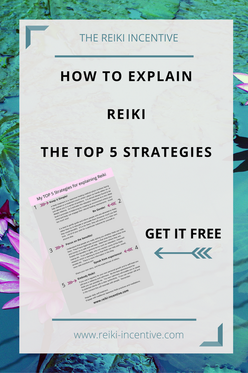
Many Reiki practitioners (new and experienced) would like to feel much more confident and comfortable when starting up a conversation to explain reiki healing with someone new. After all, whilst we know how wonderful and helpful it can be, there is no denying that it can be a real challenge to overcome the perceptions of others. This is not really surprising. Reiki is a tradition which originates in the mystical and spiritual practices of the East. Many of its secrets may not have been openly discussed in the past and might perhaps have been revealed slowly to students as their experience and knowledge developed. According to Reiki historians, Reiki began first and foremost as a spiritual practice and way of self healing. It can be a particular challenge in the West to try to explain the fundamentals of Reiki healing from scratch to a Western audience in a society that values the logical and scientific. Quite often an individual approach is needed, depending on each person's attitudes, values, preconceptions and previous level of knowledge. It is therefore quite a good idea to begin with a question, such as:
You can then tailor your response depending on the answers you receive and also dispel any misconceptions or misunderstandings that they might have. With new people, it can often be a good idea to steer away from anything that might be considered as too “out there” or “woo”. Practitioners often have a fear of being perceived in this way and there is also the concern that too much detail too soon can frighten or turn new people away. James Deacon has a fantastic approach to explaining Reiki healing. He steers away completely from referring to “energy” with clients until they have experienced a treatment and it is clear that they want to know more. He begins with: “Reiki healing is a set of 'received skills' which permit the therapist to assist individuals to relax in a very particular way, enabling their body (/mind/spirit) to access and activate its own, powerful, inherent, self healing mechanisms” So, my TOP 5 Strategies to explain Reiki healing credibly are: 1. Open the conversation simply: Reiki healing is a Japanese method which involves laying fully clothed on a treatment couch whilst I place my hands either on, or just above you in a series of positions. It is almost always found to be deeply relaxing. As it activates the relaxation response at a very deep level it promotes re-balancing by creating an environment where your mind and body can begin to heal themselves. Reiki is -
Reiki is not-
Adapted from “Reiki for Dummies” by Nina L. Paul Reiki is experiential. The best way to understand it is to try it. You could offer potential clients a short free treatment or demonstration. I have given Reiki to new clients for as little as 5 minutes and they have been able to discern the likely effects from this. 2. Be gentle: It is best to gently guide and inform people who are attracted to Reiki, rather than try to educate or persuade them (however much you feel they would benefit!). If it is for them, they will come to it in their own time. Let go of your wish for a particular outcome for yourself or anyone else. 3. Focus on the benefits (and manage expectations): Understand that people are really asking you whether Reiki can help them. They'll have legitimate concerns that what they spend their time and money on is safe and will help. Meet them where they are. If you feel confident to, focus on some of the clinical research into the benefits of Reiki. Although most studies are small, some are beginning to show that Reiki healing might help to reduce pain, anxiety and depression, improve relaxation, feelings of well-being and motivation to look after oneself. When "selling" Reiki it is also helpful to remember to manage the expectations of your potential new client. Reiki healing is powerful, but it is not a magic bullet which can promise the cure of any specific illness. Paradoxically, a very real and serious part of it's healing potential is enhanced when both the practitioner and recipient can let go and set aside the wish for any particular outcome or intention. Instead, a focus on stopping, letting go and allowing the mind and body to relax and open enables the restoration of balance and harmony. This creates a space where new perspectives and possibilities can be seen - a deeper and truer healing that has the potential to reach the underlying issues and challenges faced by your recipient. Similarly, as Reiki helps people to relax deeply, in both mind and body it could be beneficial for the symptoms of any condition which is stress related. Relaxing the mind and body also enhances our ability to cope. Reiki is safe. Reviews of clinical trials into Reiki healing have so far not identified any ill effects, but it should NEVER be used as a replacement for medical treatment. 4. Speak from experience: Explain how Reiki works for you, how you became interested in it and why. Share any other benefits you feel are relevant, but be sure to mention that your knowledge of this stems from the experiences of yourself and others (and not through clinical research). 5. Embody Reiki! If you use it regularly for your own personal growth and to self-treat you will ooze a radiance and calmness. Be the best advertisement for Reiki you can possibly be. You own calmness will enable you to speak to potential clients with a clear authenticity. If you can remain still and in the moment this will resonate with people. Remember:
I don't think that any one of these strategies is any more important than the other, but together they can work very effectively indeed. I have an easy to follow download which summarises these points. Why not download it and keep it on your phone as an aide memoir? It's free. Have I missed anything? Do you have any questions, or are there other ways you explain reiki healing to your clients? Please let me know in the comments!
Related: How do I handle non-believers?
9 Comments
Angela, The Reiki Incentive
7/29/2016 04:19:52 pm
Thank you so much for your encouragement. I'm really glad it is helpful
Reply
9/5/2016 10:41:43 pm
Thank You Very Much!! You just lightened a small load I've been carrying. I feel I will more confidently be able to talk about what I do (Reiki) without losing someone due to misunderstanding.
Reply
Angela, The Reiki Incentive
9/5/2016 10:58:40 pm
Hi there, I'm really glad that the blog post has helped! Thank you very much for commenting x
Reply
Kristina
3/27/2017 06:48:37 am
Hi and thank you for this helpfull article :) I finnished Reiki level one but havent had time to practice it. After initiation i could feel in my hands a tingling sensation but now i dont feel anything,does that mean that i lost the energi? Will it return,grow with practice? If someone doesnt use Reiki often,will there ability to help be reduced?
Reply
Angela, The Reiki Incentive
3/27/2017 04:27:46 pm
Hi Kristina,
Reply
liz
6/8/2017 06:10:42 am
You did an awesome job of explaining this-simple and straight forward- totally resonated with me!
Reply
Angela, The Reiki Incentive
6/9/2017 07:25:09 pm
Hi Liz, thank you for your comment, it's lovely to get positive feedback. I'm glad the article hits the spot. Best wishes x
Reply
Heather
6/9/2018 03:28:48 pm
I am so very grateful for what you have shared here! It is so helpful and I feel a deeper sense of confidence just by connecting with your words! Thank you.
Reply
Leave a Reply. |
Author
Angela established the Reiki Incentive for Reiki practitioners who want to see Reiki more widely accepted and to see it reach new people. She enjoys sharing her passion for authentic practice as well as research into the benefits of this wonderful therapy. Archives
May 2018
Categories
All
|

 RSS Feed
RSS Feed
